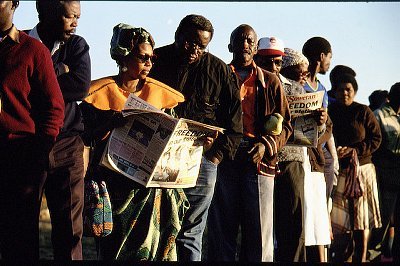This post originally appeared on the Conflict and Development blog on September 1, 2010.
How often it's happened. Standing at the podium, almost finished with the press conference, when the question which I would love to ignore is shouted out from the gaggle of reporters. As a communications professional, I wholeheartedly believe in press freedoms, but I would be lying if I didn't admit that there were times I wanted to muzzle an aggressive journalist with his "gotcha" question, or the reporter who quotes me out of context or misrepresents an issue I hold dear.
In those moments, I can see how a politician or government official, with the ability to clamp-down on the media, might succumb to the urge. The reality is that freedom of the press is a messy business. But like Winston Churchill once said of democracy, it's the worst form of government, except for all those other forms.
The current debate over press freedom in South Africa, with the government considering legislation that would allow the state to keep secret any information, if it decided that disclosure would harm the "national interest", has drawn fresh attention to the role of the media as societal watchdog.
Some people question whether media freedoms are appropriate or even relevant in fragile states where, they argue, the delicate political and social balance may be upset if people are allowed to write or broadcast exactly what they think about their government or their fellow citizens.
In places where the battle for allegiances is most ferocious, it may be optimistic or plain naïve to imagine the media playing a disinterested or independent role. And it is certainly tempting for governments in states beset by stresses on many fronts to harness or control the media; sometimes a media with questionable standards and agendas.
But to go from there to question basic press freedoms will not help build societies that are resilient to the rough and tumble of consensus-building in fractured societies. In fact, just the opposite.Here are three pragmatic reasons to consider safeguarding media freedoms in even the most fragile of states:
